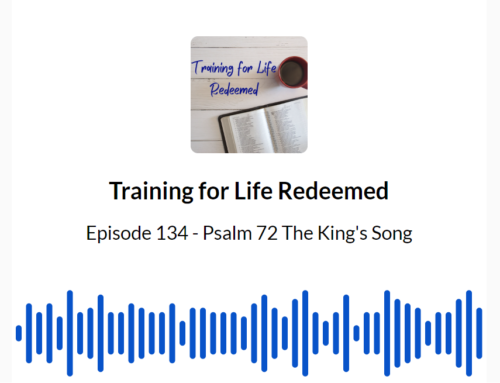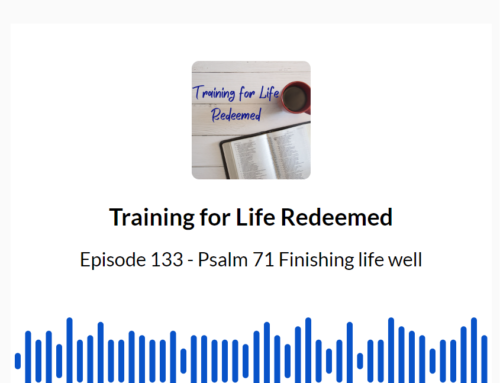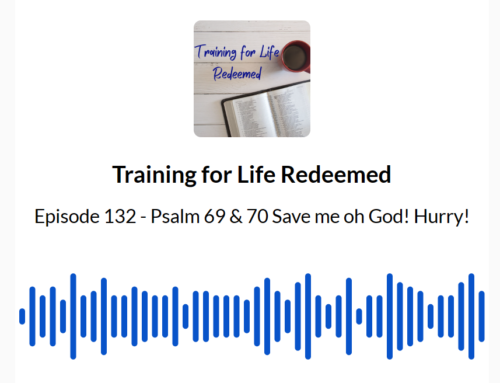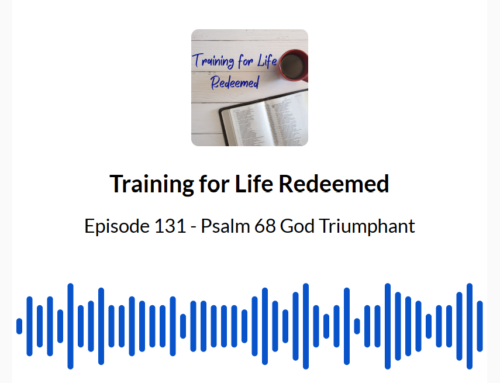Is there such a thing as a genuine believer, or are Christians just in it for the promises? Why do God’s people continue to suffer given that God has declared them innocent of all charges because Jesus died in their place? Job has a lot to teach us about life in a world gone mad.
Grab your notes for this episode by completing the form
and we will send you the link to all our notes.
Transcript
Dan: (00:00)
Hi, everyone. And welcome to trainingforliferedeemed. I’m your host, Dan, and as always, I’m joined by my father, David Jackson, Dad today we’re starting Job We are doing a bit of an overview introduction type thing to Job. Now you have been working with Job for a long time, and you’ve written this book quite a while ago. It’s “Crying out for Vindication: the Gospel, according to Job.” So I’m pretty excited to get into this. Cause I remember growing up with you learning about Job and doing radio plays and that kind of stuff. So thank you. Tell us why we’re looking at Job at this point in time.
David: (00:35)
I thought, sometime ago when we went into our second lockdown in New South Wales and you listen to people’s voices and the things that they’re struggling with. And I thought, really this is the time to get back to the book of Job. We in New South Wales, and Victoria, we’ve had bush fires, floods, pandemics, lockdowns, people have lost their jobs, terrible things are going on. And I think in all of that, I’ve been listening to the questions. People are asking about God, about justice, about all those things. And I think this is the book God put in the Bible for a time like this. So when better to go back into it
Dan: (01:18)
Now in Job Dad, he seems to live a bit longer than normal and the way it’s structured. I know when I read commentaries, they talk about it as it could possibly be a play or it’s possibly not. Can you tell us is Job likely to be a play? And then if it’s not a play, where might he fit in the timeline?
David: (01:39)
Yeah. Okay. Well, it’s not either/ or. So you have a historical person. We know where he fits. He fits between Abraham and Moses. Probably closer to Moses. We know that he is living in the land of Uz. A young man comes along who’s a Buzite. It doesn’t mean he drinks. It means he’s descended from a bloke called Buz, B U Z. And we know that Uz and Buz were the children of Abraham’s brother Nahor. So we also know from Jeremiah that the land of Uz was in the territory of Edom. And when we go to translate Job, it’s pretty clear that the language of Job is way back. And it’s, it’s east of the Jordan river. It’s in the land. it’s sort of a half a mix between Hebrew and Aramaic. So it’s a dialect and that’s where Job fits. But Job is also written in a very — it’s poetry and it’s a beautiful piece of literature. So there’s not a choice between it being literarily brilliant and it being history. It’s a way of writing history that engages the reader in the argument.
Dan: (03:01)
Yeah. It’s also a way of writing history in a way where when people, people can remember it when you read the Bible. Lots of it’s very structured and organized in a particular way, mostly because a lot of people were hearing it orally and in order to remember stuff, yeah, there’s quite good systems that exist to help people remember things.
David: (03:24)
I actually think that, I wandered around Asia quite a bit. And you find these fellows that are, that are the storytellers. You do busking in an Asian market telling stories. And I, I think Job was written for the storyteller, to get out there in the market, tell the story, get the crowd, yelling and screaming at each other. And then they go down the pub afterwards and it’s a nice anachronism. You know, they go home, they go wherever they go and they keep arguing. And we’ve been arguing about Job for 3000 years. So it’s a very effective play.
Dan: (04:01)
And that one of the things I like most about Job is if I fact that Job, you know, he’s displayed the whole way through as this innocent guy and yet lots of bad things happen to him. And I think that really hits our culture because our culture currently have this kind of mentality of if I live a good life, shouldn’t good things come my way. It’s kind of like a karma type thing that people have, even though they don’t actually believe in the whole philosophy and religious beliefs behind karma, but they do still have that kind of idea in their head of even as a Christian, if I’ve lived a good life and I’ve followed God and I’m being rules, and I’ve got this close relationship with God, shouldn’t things be going better for me. And then you’ve also got the flip side of that, of people who are Christians, but who have had poor lives beforehand, who are like, you know, am I now being punished for past sins? and you know, I know there’s passages in John that talk about that, but how does that connect in with Job for us?
David: (04:57)
Yeah, I think it is true. God is just. One of the things that we wrestle with in the book of Job is that that Job held on five truths. God is sovereign. Nothing happens. It isn’t that isn’t God’s plan. So you can’t, you know, rescue God from bad stuff that happens. He’s in charge. God is just so we know that he delivers justice and righteousness. So sins do get punished. and the righteous do get vindicated, or they get blessed to have the blessings and the curses in Deuteronomy Leviticus. We know that Job is blameless because in chapter one, God says, have you checked out my mate Job? He is blameless. He’s innocent and all the rest of it. So that’s God’s verdict on Job. We know that what happened to Job is real and it’s horrendous. He loses everything he owns, but he loses his 10 kids and that’s that’s unbearable.
David: (06:01)
And then at the end of it, there’s this sense that God is committed to Job. He loves him. Job actually expresses that in some of his speeches know it, doesn’t say you’ve got these five things and they don’t make sense. How can God be sovereign? Be just Job, be innocent and God clobber him like this. So that, that becomes the issue now in a modern world. So if I take, for example, a commentary by David Clines, it’s all God’s fault. God, God is a cosmic bully. He calls him a, so we blame God. The ancient world would never do that. So to rescue this five puzzle thing, they blame Job. And that’s all your fault. You’re not blameless, but we know the reader. He is. So we’re still stuck with these five things and Job wrestles with them. Now the solution to that, I think we find out not really finally, God never explains himself in the book of Job.
David: (07:01)
The reader knows that this is proof that Job’s faith is genuine. So the challenge in chapter one, which is the big theme of the book, is, is it possible to have a real believer or are Christians only in it for the toys? is it, you know, God promised us a rose garden and we’re therefore committed to him. As long as we get the rose garden, take away the toys and we’ll split the dummy and walk off that’s Satan’s charge. And it’s not true. there is such a thing as a real believer who loves God for who he is not for whether we get the benefits, but when you come to the new Testament, you discover isn’t Job like Jesus here is the righteous blameless, innocent man. And the world hates him.
David: (07:57)
And at the end of the day, he’s vindicated. And then when you get past Jesus, you know, the suffering servant, you get to the apostles and the early church and they are going to suffer. God, Jesus says, I’m sending you out the world of suffer because you”re buying time for people to hear the gospel and get saved, and I’m going to hang off on judgment day and you get out there and do the job. But unfortunately, you’re going to go into this world that hates you, and you’re going to cop injustice. And you’re going to have to put up with all the other things that go with being in a fallen world. But it doesn’t mean I don’t love you. And so when you find the, the apostles in prison being flogged, they’re singing, and they’re saying we count it a great privilege to fill out the sufferings of Christ.
David: (08:46)
So the righteous do suffer, not as punishment, but because we we’re on this mission to the world to declare the gospel, there’s, Job sitting on his ash heap, covered in boils, he’s lost everything. And he’s standing there saying, I will not deny that I am blameless. I will not deny my integrity because God has forgiven me of my sins. I’m not going to cop the blame for this. You know, God’s taking care of that. and this brings us back to the whole idea of perseverance of the faith. and knowing that, yeah, God’s in charge now. He doesn’t explain himself. He’s not accountable to us. That’s a big message in church. We’re here to glorify him. It’s not about me.
Dan: (09:38)
Yeah. That’s definitely something that our culture needs to hear a lot more about is that, you know, the world is not created just for us. It is created to glorify God. And we get the benefit of enjoying God forever, but not, not. This is not for self-gratification. It’s not, it’s not there for us with,
David: (09:56)
And that’s a big thing. You know, I, I hear it really annoyed me when I was teaching Bible in high school lots. And lots of people got up on assembly and other things I am, God is there for us. And you end up with this culture that thinks, you know, God is my Butler. You know, I need a new Mercedes ring the bell, where are the blessings? You’ve got prosperity, theology running around and that give God all your money and he’ll make you rich. And that swept through Africa. It’s terrible, terrible theology. But here we are. I am God’s servant. This is Job. My servant. We’re here to serve. That’s what gives meaning to our lives is that we live to glorify God. And there’s great dignity in the suffering. So we don’t need to, you know, go and sit in the corner and spit the dummy and carry on like a bunch of, you know, whatevers I, I actually said to somebody the other day, you know, you’re in a world you’re raging about the injustice of the world. What did you expect? And now you’ve read Genesis. What did you expect from a sinful world? You know, it’s a terrible, you know, you can use the phrase badly, but sometimes Christians need to hear, “Suck it up, buttercup.” You know, that we’re called to endure and persevere. And Job is our man as is Jesus, as were the apostles as were the prophets. You go back a little bit. We are more than conquerors, but that means we have to conquer.
Dan: (11:31)
Well, thank you so much. There are lots of other questions that I’m really going to get to throughout this process, including whether or not Job does anything wrong throughout the book. Cause he’s innocent, definitely throughout the book and at the beginning, but that last little bit is he still innocent or, you know, has he done something wrong? We’ll look into that a bit more. We are looking to the whole theological debates that happen throughout this book. And if we start off with chapter one where people will have plenty of questions about chapter one with Satan, talking to God in heaven, having this kind of bargaining argument type thing going on. And I know that we have to find out who’s actually structuring and getting this book going in the direction that’s going to go. Who’s, who’s actually in control of these events. It’s really sets itself up well in chapter one.
Dan: (12:16)
So if you’re listening, please make sure that you come back next week, join us for that. As we get stuck into Job chapter one. And if you want the study notes that go along with this intro and you can head to training for life redeemed.com/ 48, and you can get the study notes there. Otherwise please leave us a review. We’d love to see some more reviews go up in, apple and on Spotify or wherever else you can leave reviews. Let us know what you think of the podcast so far. And of course ensure you subscribe and come back and join us next week.



